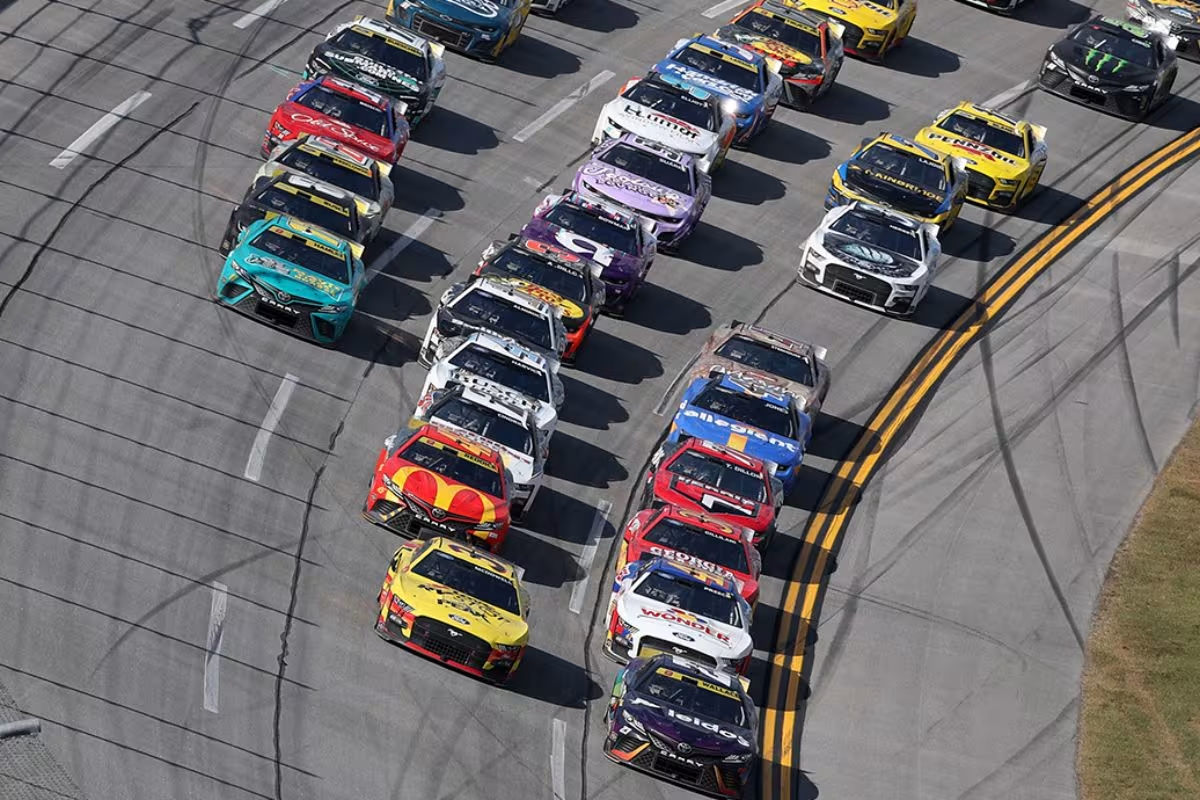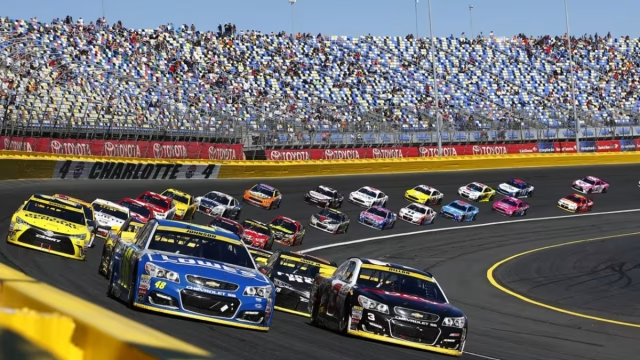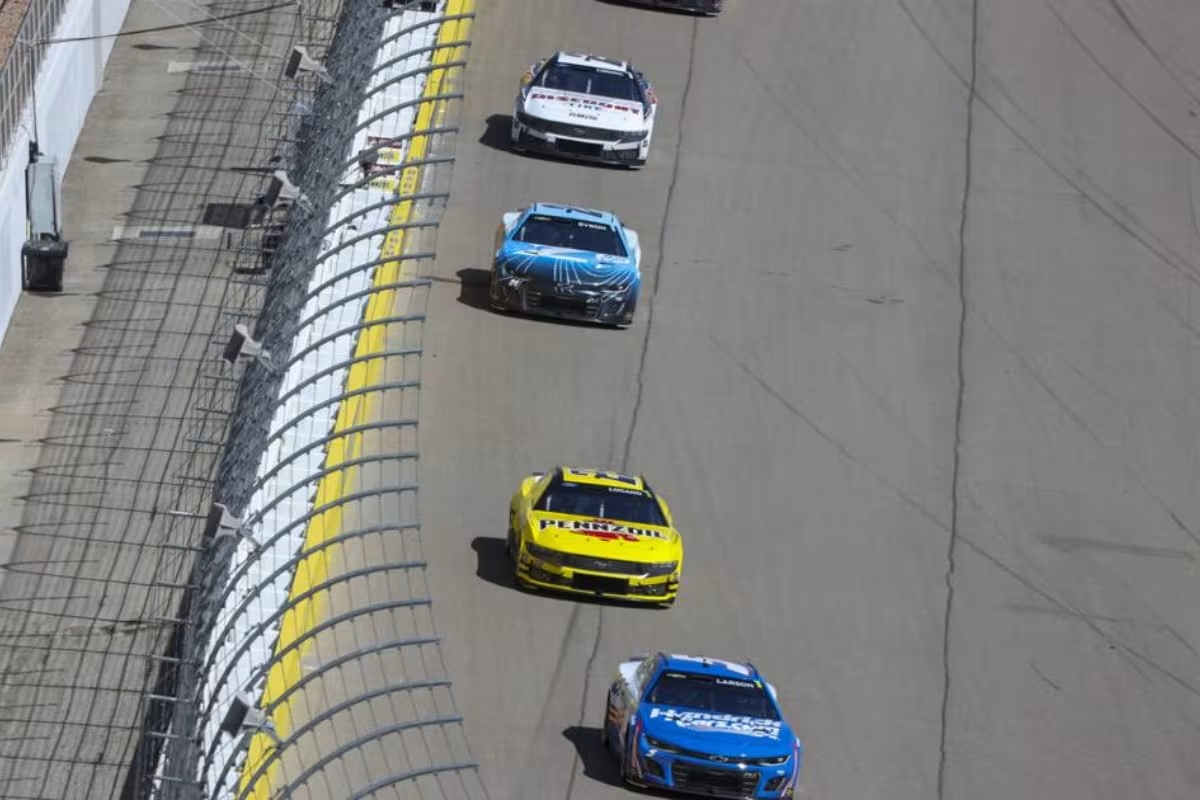NASCAR’s unseen tactics to create rivalries are evident in how the organization skillfully manages competition among teams by using rules and tactics to keep them apart. The recent NASCAR charter dispute between 23XI Racing and Front Row Motorsports shows how ignoring the rules can break unity among teams. By setting strict deadlines for signing charters, NASCAR makes the competition tougher and raises the stakes, causing friction where there used to be agreement. This careful strategy not only strengthens NASCAR’s control but also boosts corporate power by increasing rivalries.
Key Highlights
- NASCAR’s enforcement of charter agreements creates tension among teams, fostering rivalries and competition for limited resources and sponsorships.
- Private negotiations and meetings allow NASCAR to isolate dissenting teams, reducing their collective bargaining power and increasing inter-team conflicts.
- By withholding special treatment from non-compliant teams, NASCAR encourages compliance through peer pressure, deepening rivalries among those who adhere versus those who resist.
- The ultimatum for signing new NASCAR charter deals amplifies stakes, pushing teams to compete more fiercely against each other for financial survival.
- Legal disputes, like those between 23XI Racing and FRM, highlight divisions within the racing community, enhancing corporate rivalries and NASCAR’s influence over team dynamics.
Joint Statement and NASCAR Charter Dispute
The ongoing dispute between 23XI Racing and Front Row Motorsports (FRM) regarding their NASCAR charter status has highlighted tensions within the NASCAR ecosystem. Both teams, in a joint statement, have expressed their commitment to compete in the upcoming Cup Series season while simultaneously filing for an injunction to maintain their chartered status.
This paradoxical stance raises questions about the tactical maneuvers within the organization, as both teams refuse to sign the new NASCAR charter agreement, indicating a reluctance to adapt to evolving regulations.
The core of the dispute centers around the implications of the NASCAR charter system, which dictates the operational framework for teams within NASCAR. By pursuing legal action on anti-trust grounds while seeking an injunction to safeguard their current status, 23XI Racing and FRM appear to be traversing a complex landscape of competition and compliance.
This dual approach suggests a desire to secure financial stability without fully embracing the contractual obligations that come with the new NASCAR charter agreement.

NASCAR’s response to the preliminary injunction, which highlights its need to plan for a fixed number of chartered teams, accentuates the organization’s position in this unfolding drama. The organization is not only focused on maintaining its competitive balance but also on reinforcing its authority in the face of dissent.
As these teams grapple with their identities within NASCAR’s framework, the implications of their dispute may ripple throughout the series, affecting future interactions and rivalries among teams, ultimately shaping the landscape of stock car racing.
NASCAR’s Charter Requirements and Team Response
In the middle of the ongoing tension between 23XI Racing and Front Row Motorsports, NASCAR’s charter requirements have emerged as a crucial issue influencing team dynamics and future participation in the Cup Series. The recent ultimatum presented by NASCAR, demanding that teams sign a new NASCAR charter deal by midnight on September 6, has intensified the stakes for both teams. Their refusal to comply has placed them on unstable ground, as they face the imminent loss of their charters and the considerable financial repercussions that accompany such a setback.
The implications of this situation extend beyond mere contractual obligations; they threaten the viability of drivers and sponsors associated with 23XI Racing and Front Row Motorsports. Both teams are currently pursuing a preliminary injunction to guarantee they can compete in the upcoming season while managing the legal complexities against NASCAR.
However, NASCAR’s resolute stance signals an unwillingness to accommodate the dissenters, as exemplified by their assertion that the deadline for signing the 2025 NASCAR Charter Agreement has long expired.
The tactical maneuvering by NASCAR not only reinforces its control over the charter system but also serves to nurture a competitive atmosphere among teams. By compelling compliance from most participants, NASCAR effectively isolates 23XI Racing and Front Row Motorsports, thereby creating an environment ripe for rivalry.
NASCAR’s Stance and Team Dynamics
Maneuvering through the intricate landscape of NASCAR’s current charter negotiations reveals a tactical maneuvering that emphasizes the organization’s commitment to maintaining control over its teams. The recent developments indicate a calculated response to dissent, particularly from teams that have challenged NASCAR’s authority.
With 32 teams under its stewardship, NASCAR’s decision to withhold special treatment from the dissenting teams is a clear assertion of its power, reflecting a desire to project strength rather than vulnerability.
“The deadline for plaintiffs to sign the 2025 NASCAR Charter Agreement expired weeks ago, and NASCAR has taken steps, consistent with its contractual obligations to other charter teams, to plan for a season with only 32 charters. Plaintiffs do not need these charter agreements to race, and indeed have stated publicly that they will be racing in NASCAR regardless.” – NASCAR
The Racing Team Alliance initially appeared unified in its demands, but the specter of losing charters—a lifeline that guarantees participation and financial stability—has effectively fractured this solidarity. The pressure of potential exclusion from guaranteed spots on the grid has compelled many teams to acquiesce to NASCAR’s demands, revealing the intricate interplay between power dynamics and individual team interests.
Importantly, the private one-on-one meetings facilitated by NASCAR served to further undermine collective bargaining efforts, demonstrating a keenly orchestrated strategy to isolate dissenters.
As a result, the team landscape is now marked by a noticeable tension, with only 23XI Racing and Front Row Motorsports standing apart from the prevailing compliance.
Implications for Future Seasons and Court Hearing
Steering through the implications of NASCAR’s recent charter negotiations reveals a complex interplay of legal and financial considerations that could reshape the landscape of the sport in the coming seasons. At the heart of this development is NASCAR’s commitment to the 32 teams that accepted the new charter deal, in the midst of ongoing litigation with two dissenting teams. This highlights a vital turning point where NASCAR must balance its contractual obligations with the need to cultivate a competitive environment.
“NASCAR carries contractual obligations to the 13 teams that accepted its offers of the 2025 NASCAR charters, and consistent with the teams of the 2025 charter, NASCAR is working on relocating funds that plaintiffs would have received to increase prize money and other special awards for the 2025 season for the benefits of the teams that timely executed 2025 charters.”
“As well as open teams who can compete to win increased prize money and other special awards.” -the statement
The tactical relocation of funds to improve prize money and special awards for the 2025 season emphasizes NASCAR’s intent to incentivize compliance among NASCAR charter teams. This initiative not only rewards those who signed the charters but also creates an intriguing opportunity for open teams to vie for increased payouts, thereby intensifying competition on the track. The ramifications of these financial maneuvers may extend far beyond immediate benefits, potentially altering team dynamics and rivalries as the sport progresses.
However, the forthcoming court hearing on November 4 presents an unpredictable variable. The outcome of the preliminary injunction could redefine NASCAR’s approach to governance and its regulatory power over teams.
A ruling in favor of the plaintiffs could destabilize NASCAR’s carefully orchestrated financial framework and undermine the perceived value of the NASCAR charters themselves. Consequently, the intersection of legal outcomes and financial strategy is poised to influence not only the structure of NASCAR but also the competitive spirit that fuels its very core.
News in Brief: NASCAR’s Unseen Tactics to Create Rivalries
The intricate dynamics between NASCAR, team charters, and corporate interests reveal a deliberate strategy to cultivate rivalries that improve competitive tension and viewer engagement. As teams navigate NASCAR charter requirements and respond to NASCAR’s regulatory framework, the implications of these actions will shape future seasons.
The upcoming court hearing may further illuminate the complexities of this corporate landscape, underscoring the delicate balance between collaboration and competition within the sport, ultimately influencing the path of NASCAR’s evolution.
ALSO READ: NASCAR Afraid of Christopher Bell’s Talent? The Unspoken Truth Behind His Media Silence


